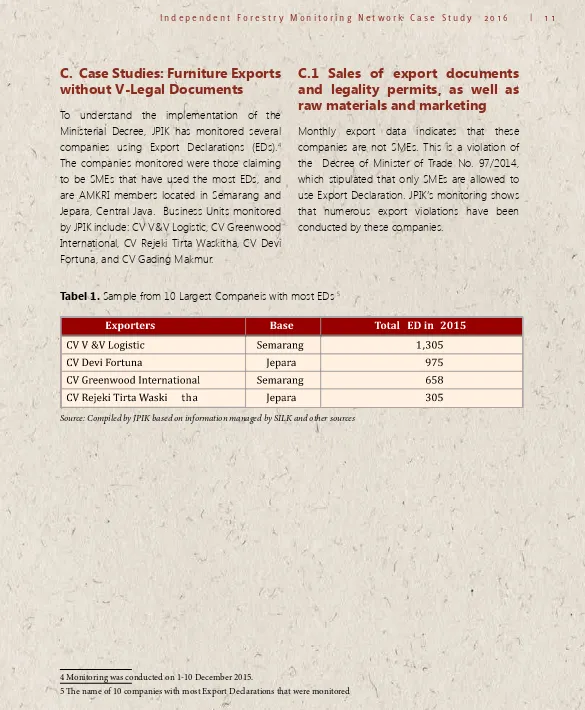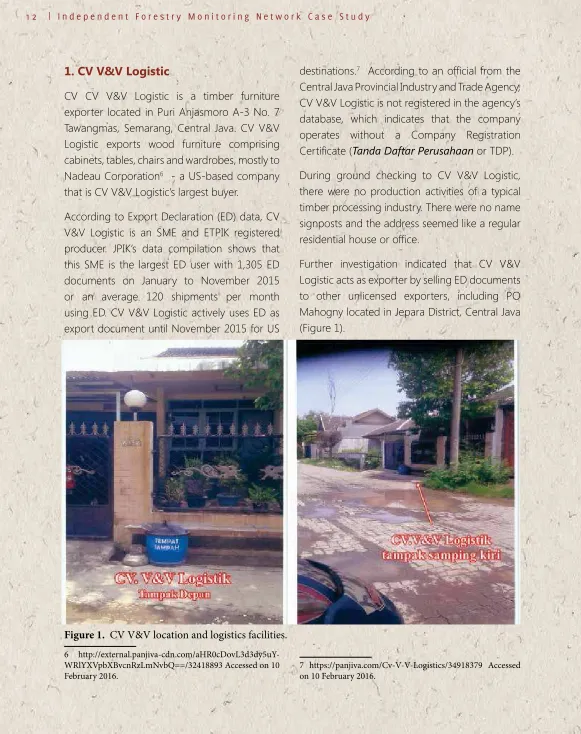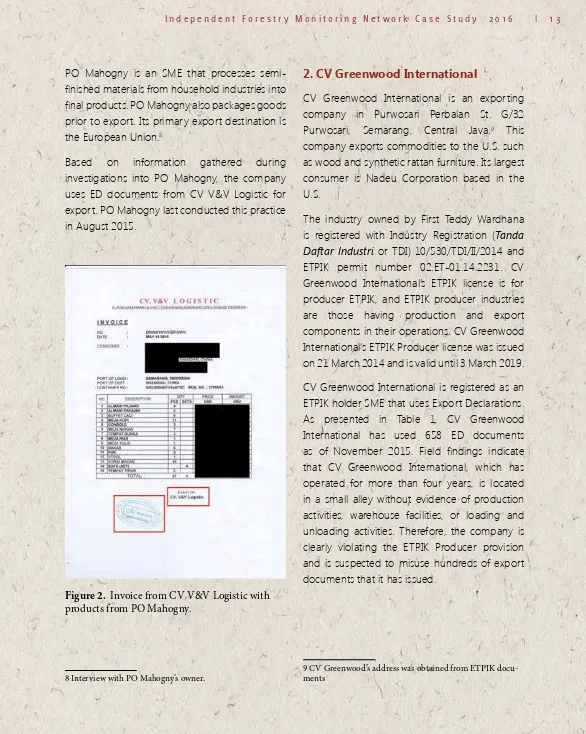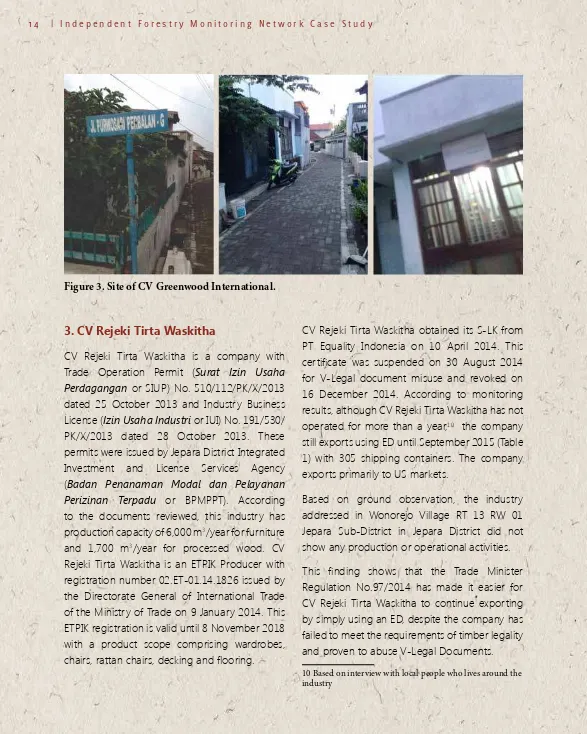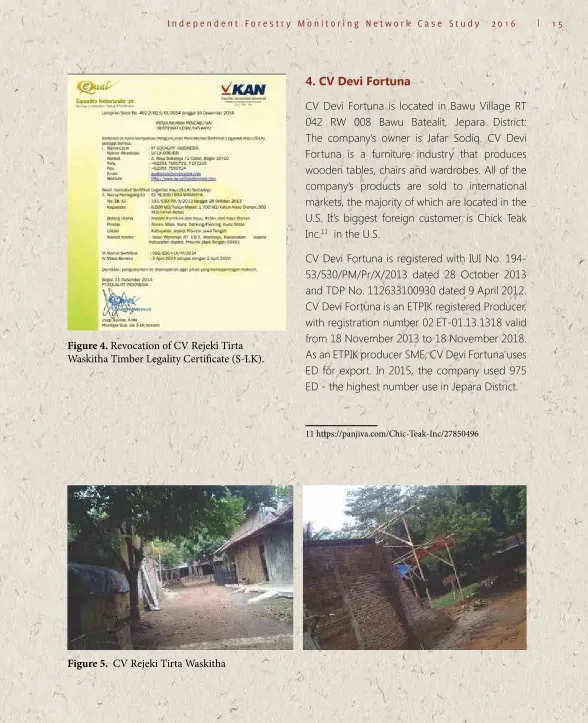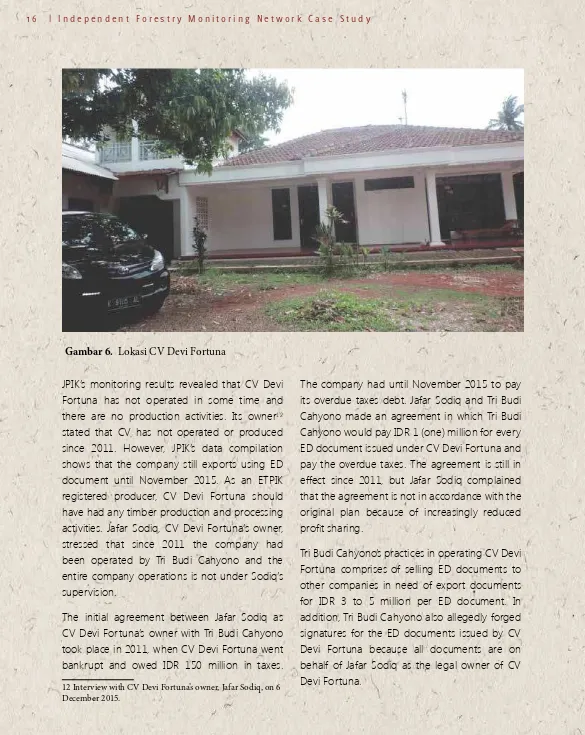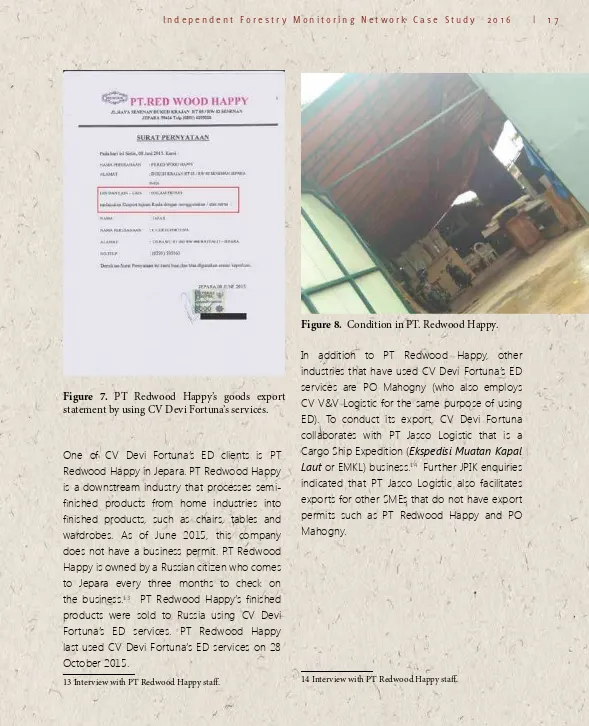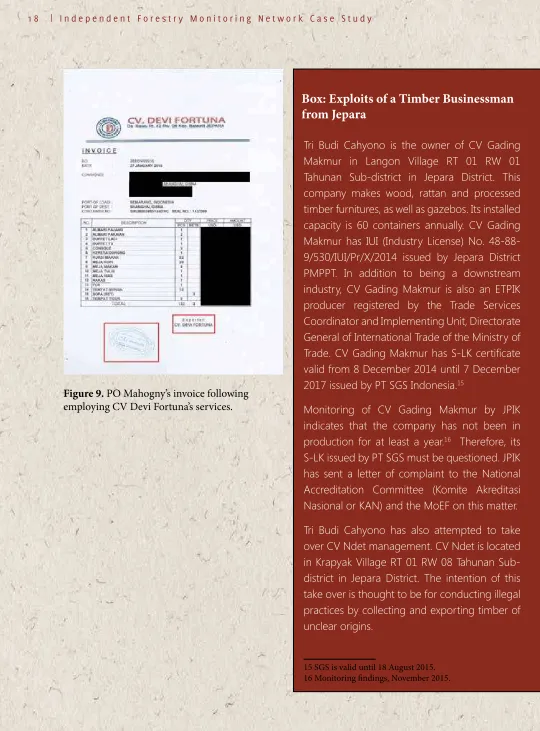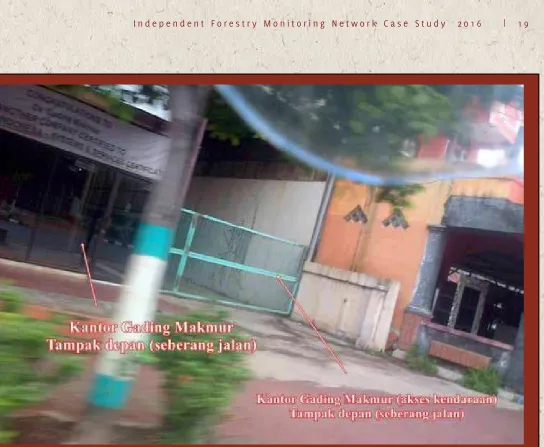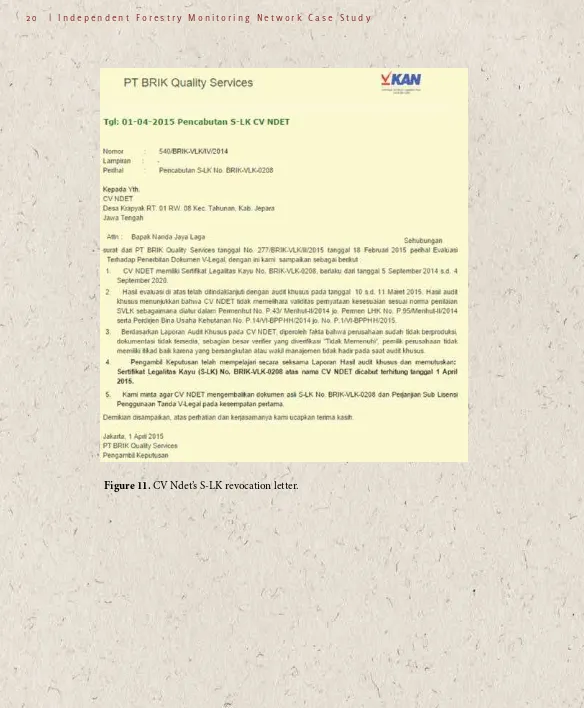of Trade Decree Beneits Shadowy
Timber Exporters & Undermines legal
Reforms
Case Study: Violations of Numerous Regulations by
Companies in the Name of SMEs
Acknowledgement
I n d e p e n d e n t F o r e s t r y M o n i t o r i n g N e t w o r k 2 0 1 6
Case Study: Violations of Numerous Regulations by
Companies in the Name of SMEs
of Trade Decree Beneits Shadowy
Case Study: Violations of Numerous Regulations by
Companies in the Name of SMEs
Author :
Mardi Minangsari, Muhamad Kosar, Dhio Teguh Ferdiyan March 2016
Editor : Mardi Minangsari, Christian P.P. Purba, Arbi Valentinus, Jago Wadley, Muhamad Kosar Photo : JPIK
Layout : Wishnu Tirta ©JPIK 2016
Jl. Sempur Kaler No. 62 Telp. 0251 8317926 Fax . 0251 8317926
Email: jpikmail@gmail.com www.jpik.or.id
Loopholes in Legality: How a Ministry
of Trade Decree Beneits Shadowy
PREFACE
Between 1998 and 2014 Indonesia fought a long battle with illegal logging. Calls to save Indonesia’s forests gained national, regional and even international attention. To improve forest governance, the
Indonesian Government developed a Timber Legality Assurance System (in Indonesia, Sistem Verii -kasi Legalitas Kayu or SVLK) which came into effect on September 2010. This system aimed to ensure that the timber industry can obtain legal raw materials from a sustainable forest resources manage-ment system with transparent and accountable governance.
However, while SVLK was developed as a persuasive approach to close loopholes for illegal logging, the Ministry of Trade reopened loopholes with the aim of increasing export revenues. The Decree of Minister of Trade No. 89/M-DAG/PER/10/2015 concerning Forestry Industry Product Export Re-quirements issued on October 2015 drew concerns from many stakeholders because the regulation
conlicts with the ongoing governance reform processes developed over the past decade and a
half. Under this deregulation, downstream industries are no longer required to have Timber Legality
Certiicates (Sertiikat Legalitas Kayu or S-LK). This policy will surely facilitate more illegal logging in
Indonesia.
As organizations committed to improving forest governance in Indonesia, JPIK, FWI and EIA initiated
a ield study aiming to examine the likely impact of Minister of Trade Decree No. 89/2015 on ongoing
reform processes.
This report was compiled from monitoring conducted between November 2015 and March 2016. Monitoring activities focused on Small and Medium Enterprises (SMEs) dominating furniture product exports from Indonesia.
JPIK would like to thank its members and JPIK Focal Points for their assistance in the monitoring pro-cesses. JPIK, FWI and EIA also thank UKaid for its assistance in publishing this report.
March 2016, Christian P.P. Purba Zainuri Hasyim Muhamad Kosar
CONTENTS
Preface ...
Contents ...
Summary ...
Introduction ...
Obstacles To Reforming Indonesia’s Timber Sector ...
Who is Behind the Opposition against SVLK? ...
Case Studies: Furniture Exports without V-Legal Documents ...
Sales of export documents and legality permits, as well as raw materials
and marketing ...
1. CV V&V Logistic ...
2. CV Greenwood International ...
3. CV Rejeki Tirta Waskitha ...
4. CV Devi Fortuna ...
Inconsistent regulations ...
Recommendations ...
1
3
5
6
7
9
21
However, as full SVLK and VPA implementation approaches, a group of businesses in the name
of AMKRI suddenly iled an open objection
and conducted aggressive high-level lobbying to exclude a group of furniture products from the SVLK scheme. Their excuse was that the SVLK burdens the association’s SME members. Based on the agreement between Minister of Environment and Forestry, Minister of Trade and Minister of Industry, the Decree of Minister of Trade No. 97/2014 was issued to implement Export Declaration (ED) for wood furniture and handicrafts SMEs. At the time, ED was meant to be a transitional regulation while SME preparation, strengthening and assistance are increased. By 1 January 2015, all Indonesian timber products were expected to comply with the SVLK and this Decree of Minister of Trade will be in line with the SVLK scheme that has been implemented for approximately 5 years.
Based on an inquiry made by the Independent Forestry Monitoring Network (JPIK) of several companies using ED, there are strong indications of illegality, including active exports by
SUMMARY
Since the ratiication of the VPA, various efforts to expedite the full implementation of the SVLK and FLEGT Licensing have been undertaken in the country. This includes amending SVLK-related policies to facilitate community forest owners and SMEs to meet the requirements to obtain SVLK by adopting DKP in the SVLK scheme, as well as facilitation and assistance for small and medium scale enterprises.
companies that have not operated for more than a year, companies not registered in the local Trade and Industry Agency, as well as companies forging signatures for Export Documents. It was also learned that companies with revoked S-LK
certiicates after being proven to misuse V-Legal
Documents were using the Ministry of Trade’s loopholes to continue exporting.
Based on the types of ED-using exporters monitored by JPIK, most are brokers taking an
advantage of this Ministerial Decree for proits.
6 | I n d e p e n d e n t F o r e s t r y M o n i t o r i n g N e t w o r k C a s e S t u d y
The Indonesian government implemented the SVLK to ensure that all timber products circulated and traded in Indonesia have clean and clear legal status. With the SVLK, domestic and foreign consumers no longer need to doubt the legal status of timber circulating in or originating from Indonesia. Therefore, the SVLK has been implemented to ensure legality of Indonesian timber in the global market. This effort is expected to improve competitiveness of Indonesian timber and reduce illegal logging and trade. More than that, the SVLK implies a serious and consistent commitment to improve forestry governance in Indonesia.
The SVLK is an approach to complement existing law enforcement measures by the Government. Timber governance and administration can be corrected through a system that can be monitored by all parties and is credibly implemented. On the other hand, the governments of several consumer countries have implemented regulations requiring proven legality of timber, including imported timber, in each country. 1
1 Timber Legality Information System.
The Timber Legality Assurance System (Sistem Veriikasi Legalitas Kayu or SVLK) functions to ensure timber products and their raw materials are obtained from forest sources and management systems that meet legal requirements. Timber is considered legal if its sources, harvesting permits, harvesting system and procedures, transport, processing and trade or change of hands can be proven to meet all applicable legal requirements.
B. Obstacles To Reforming
Indonesia’s Timber Sector
The SVLK aims to improve forest governance through ensuring the legality of harvested, transported, processed and marketed timber by Indonesia’s forestry business units. Indonesia’s efforts in implementing this system aims to eradicate illegal logging and illegal timber trade as well as prove the legality of timber and its derivative products. This is in line with the global timber market’s tendency to demand legality assurance. Following the Bali Declaration in 2001, the SVLK was developed in Indonesia through a participatory multistakeholder initiative and process, which was then enacted as a Decree of the Minister of Forestry No. P.38 of 2009.
Indonesia exports various forest products including plywood, pulp and numerous paper products, and furniture and handicrafts. The leading export markets for Indonesia’s timber products include countries in Asia, United States of America and the European Union. Timber legality assurance is an absolute step in ensuring that exported timber and timber products are are made with timber that complies with the applicable laws of Indonesia. Therefore, this system guarantees that the timber is sourced through legal harvesting and timber products have been processed, transported, and sold legally. The SVLK thus contributes towards increasing the competitiveness of Indonesia’s timber products in global markets, and is a good step toward sustainable forest management.
Meanwhile, the European Union (EU) - one of Indonesia’s key timber markets – has issued the
European Timber Regulation (EUTR) speciically
to halt the circulation of illegal timber in European Community markets. This regulation came into force on March 2013. All Operators in all EU member states have to undertake due diligence to ensure the timber they place on the market is legal. EU Member States are obliged to police their efforts.
Starting 2007, Indonesia and the European Union have been negotiating a Voluntary Partnership Agreement (VPA) under the EU’s Forest Law Enforcement, Governance and Trade
(FLEGT) initiative. At the third Senior Oficials
Meeting (SOM) in Brussels in April 2011, an agreement was made regarding the VPA text and nine annexes, in which SVLK was approved as the system to be applied to prove the legality of Indonesian timber.
The VPA between Indonesia and the European Union was signed on 30 September 2013 and
both parties ratiied the agreement in 2014. Indonesia ratiied the VPA through Presidential
Decree No. 21 of 2014. When VPA comes fully into force, all timber products exported from Indonesia to the EU are covered by a FLEGT license (referred to as V-Legal Document in Indonesia). FLEGT Licensies will be exempted from the EUTR, providing a so-called “Green Lane” into the EU for SVLK-compliant Indonesian wood products.
Since the VPA’s ratiication, various efforts to
8 | I n d e p e n d e n t F o r e s t r y M o n i t o r i n g N e t w o r k C a s e S t u d y
(Deklarasi Kesesuaian Pemasok or DKP) in the SVLK scheme, as well as through direct facilitation and assistance for SME groups.
In addition to the EU, other consumer countries have also developed legislation to prevent illegal timber from entering their markets, such as the U.S. (Lacey Act), Australia (Illegal Logging Prohibition Act or ILPA). Japan is in the process of developing similar provisions (Green Konyuho/ Goho Wood). On the other hand, Vietnam as
one of the major timber exporters is in the latter
stages of VPA negotiations with the EU. China,
which is one the major markets for Indonesian
timber products and one of the largest timber product exporters, is also preparing its own Timber Legality Assurance System scheme.
However, as full implementation of SVLK and VPA approaches, a group of businesses in the name of Indonesia Furniture and Craft Association (Asosiasi Mebel dan Kerajinan Indonesia or
AMKRI) suddenly iled an open objection and
Based on an agreement between the Ministers of Environment and Forestry, Trade, and Industry, the Decree of Minister of Trade No. 97/2014 was issued which instituted an Export Declaration (ED) for the wood furniture and handicrafts of SMEs. Such Export Declarations were an alternative customs requirement to the V-Legal document in the previous export regulation that is Decree of Minister of Trade No. 64/2012. This mechanism applied to furniture and handicraft SMEs without Timber Legality
Certiicates (Sertiikat Legalitas Kayu or S-LK) by requiring that raw materials were sourced from suppliers that have Sustainable Production Forest
Management Certiicate (Sertiikat Pengelolaan Hutan Produksi Lestari or S-PHPL), S-LK or DKP. At the time, Export Declarations were designed to be a transitional mechanism toward full SVLK implementation, including V-Legal Document implementation, while continuing to push for the preparation, strengthening and assistance for SMEs. Under the Decree of Minister of Trade No. 97/2014, by 1 January 2015 all Indonesian timber products were expected to comply with SVLK, in line with the SVLK scheme, which has been implemented across the remaindefr of the forestry and timber industries for approximately 5 years.
On 21 October 2015, the Minister of Trade made a public statement supporting SVLK and emphasizing that all downstream industries including furniture and handicrafts will fully comply with SVLK regulations by 1 January 2015. On the following day however, the Minister of Trade announced the issuance of a Ministerial Decree No. 89 dated 19 October 2015 that exempted 15 HS Codes from the furniture and handicraft group from SVLK system.
The issuance of Decree of Minister of Trade No. 89 in late 2015 created a loophole in the SVLK’s ability to ensuring the legality of the exported timber products. One of which is by changing the regulations for forestry industry products, which eliminates requirements for Forestry Industry Products Exporter Registry (Eksportir Terdaftar Produk Industri Kehutanan or ETPIK).
In addition, this regulation nulliied the time
limit for the Export Declaration mechanism for
uncertiied wood products, effectively extending it indeinitely beyond the 31 December 2015
deadline. Minister of Trade Decree No. 89 2015 therefore inspired a strong reaction from the Ministry of Environment and Forestry, environmental watchdog groups, and responsible businesses, including furniture associations, who all stated that SVLK implementation does not hamper the export of Indonesia’s timber products.
B.1. Who is Behind the Opposition
against SVLK? ?
In late 2014, AMKRI’s name emerged in various media following its issuance of a statement
rejecting the SVLK in downstream industries,
especially those focused on furniture and handicrafts. The exact reason behind AMKRI’s
objection is still unknown. However, an
1 0 | I n d e p e n d e n t F o r e s t r y M o n i t o r i n g N e t w o r k C a s e S t u d y
AMKRI is a forum for businesses closely afiliated with the furniture, handicraft and semi-inished
goods industry. AMKRI was formed in 2007 – originally as a rattan furniture and handicraft association – following a division within the Indonesia Furniture and Handicraft Industry Association (Asosiasi Industri Permebelan dan Kerajinan Indonesia or ASMINDO). Mr. Sunoto, who ran as a candidate along with Rini Suwandi, was not elected in the 2006 ASMINDO National Conference. Mr. Sunoto also felt that several suggestions were poorly facilitated within ASMINDO. This division led to Mr. Sunoto’s resignation from ASMINDO, followed by the exit of several ASMINDO Central Executive Board members, to form AMKRI.2
Rudi Halim currently heads ASMINDO as Chairman with four deputy chairpersons. There are three Boards in AMKRI, namely Board of Experts, Board of Ethics and Board of Advisors. Mr. Sunoto is a members of the Board of Advisors. AMKRI’s website indicates the association has 283 members distributed in nine provinces including Bali, Banten, Yogyakarta, Jakarta, Central Java, West Java, East Java, Riau Islands and North Sulawesi. However, at a High Level Market Dialog on 23 November 2015 Mr. Sunoto’s claimed that AMKRI has 3,000 members, 30% of which have had no choice but to adopt the SVLK.
2 Interview with an ASMINDO member.
According to JPIK’s monitoring, from the 283 AMKRI members listed in the website, several are companies working in non-timber furniture and craft industries, such as ceramic shops, and housing developers. For example PT Dewangga Nuansa Svarna based in Cibubur, West Java that is a housing developer.
AMKRI is the most vocal group in ighting to
nullify SVLK compliance in the timber furniture and handicraft sector. In every meeting attended, Mr. Sunoto always states that SVLK is an obstacle for downstream industries. He claims
that it is suficient for the SVLK to be limited to
upstream logging industries. In addition to it being a complication, Mr Sunoto also claims the
SVLK audit and veriication processes are costly. AMKRI’s objection to the SVLK is believed to be
behind the issuance of Minister of Trade Decree No. 89/2015 which allows producers of 15 HS Codes in Annex 1 for Group B to export without SVLK or V-Legal Documents.3
C.1 Sales of export documents
and legality permits, as well as
raw materials and marketing
Monthly export data indicates that these companies are not SMEs. This is a violation of the Decree of Minister of Trade No. 97/2014, which stipulated that only SMEs are allowed to use Export Declaration. JPIK’s monitoring shows that numerous export violations have been conducted by these companies.
C. Case Studies: Furniture Exports
without V-Legal Documents
To understand the implementation of the Ministerial Decree, JPIK has monitored several companies using Export Declarations (EDs).4
The companies monitored were those claiming to be SMEs that have used the most EDs, and are AMKRI members located in Semarang and Jepara, Central Java. Business Units monitored by JPIK include: CV V&V Logistic, CV Greenwood
International, CV Rejeki Tirta Waskitha, CV Devi
Fortuna, and CV Gading Makmur.
4 Monitoring was conducted on 1-10 December 2015.
Tabel 1. Sample from 10 Largest Companeis with most EDs 5
5 he name of 10 companies with most Export Declarations that were monitored
1 2 | I n d e p e n d e n t F o r e s t r y M o n i t o r i n g N e t w o r k C a s e S t u d y
1. CV V&V Logistic
CV CV V&V Logistic is a timber furniture
exporter located in Puri Anjasmoro A-3 No. 7
Tawangmas, Semarang, Central Java. CV V&V Logistic exports wood furniture comprising cabinets, tables, chairs and wardrobes, mostly to Nadeau Corporation6 - a US-based company
that is CV V&V Logistic’s largest buyer.
According to Export Declaration (ED) data, CV V&V Logistic is an SME and ETPIK registered producer. JPIK’s data compilation shows that this SME is the largest ED user with 1,305 ED documents on January to November 2015 or an average 120 shipments per month using ED. CV V&V Logistic actively uses ED as export document until November 2015 for US
6 http://external.panjiva-cdn.com/aHR0cDovL3d3dy5uY-WRlYXVpbXBvcnRzLmNvbQ==/32418893 Accessed on 10 February 2016.
destinations.7 According to an oficial from the
Central Java Provincial Industry and Trade Agency, CV V&V Logistic is not registered in the agency’s database, which indicates that the company operates without a Company Registration
Certiicate (Tanda Daftar Perusahaan or TDP). During ground checking to CV V&V Logistic, there were no production activities of a typical timber processing industry. There were no name signposts and the address seemed like a regular
residential house or ofice.
Further investigation indicated that CV V&V Logistic acts as exporter by selling ED documents to other unlicensed exporters, including PO Mahogny located in Jepara District, Central Java (Figure 1).
7 https://panjiva.com/Cv-V-V-Logistics/34918379 Accessed on 10 February 2016.
PO Mahogny is an SME that processes
semi-inished materials from household industries into inal products. PO Mahogny also packages goods
prior to export. Its primary export destination is the European Union.8
Based on information gathered during investigations into PO Mahogny, the company uses ED documents from CV V&V Logistic for export. PO Mahogny last conducted this practice in August 2015.
8 Interview with PO Mahogny’s owner.
2. CV Greenwood International
CV Greenwood International is an exporting company in Purwosari Perbalan St. G/32 Purwosari, Semarang, Central Java.9 This
company exports commodities to the U.S. such as wood and synthetic rattan furniture. Its largest consumer is Nadeu Corporation based in the U.S.
The industry owned by First Teddy Wardhana is registered with Industry Registration (Tanda Daftar Industri or TDI) 10/530/TDI/II/2014 and ETPIK permit number 02.ET-01.14.2231. CV Greenwood International’s ETPIK license is for producer ETPIK, and ETPIK producer industries are those having production and export components in their operations. CV Greenwood International’s ETPIK Producer license was issued on 21 March 2014 and is valid until 3 March 2019.
CV Greenwood International is registered as an ETPIK holder SME that uses Export Declarations. As presented in Table 1, CV Greenwood International has used 658 ED documents
as of November 2015. Field indings indicate
that CV Greenwood International, which has operated for more than four years, is located in a small alley without evidence of production activities, warehouse facilities, or loading and unloading activities. Therefore, the company is clearly violating the ETPIK Producer provision and is suspected to misuse hundreds of export documents that it has issued.
9 CV Greenwood’s address was obtained from ETPIK docu-ments
1 4 | I n d e p e n d e n t F o r e s t r y M o n i t o r i n g N e t w o r k C a s e S t u d y
3. CV Rejeki Tirta Waskitha
CV Rejeki Tirta Waskitha is a company with
Trade Operation Permit (Surat Izin Usaha
Perdagangan or SIUP) No. 510/112/PK/X/2013 dated 25 October 2013 and Industry Business License (Izin Usaha Industri or IUI) No. 191/530/ PK/X/2013 dated 28 October 2013. These permits were issued by Jepara District Integrated Investment and License Services Agency (Badan Penanaman Modal dan Pelayanan
Perizinan Terpadu or BPMPPT). According to the documents reviewed, this industry has production capacity of 6,000 m3/year for furniture
and 1,700 m3/year for processed wood. CV
Rejeki Tirta Waskitha is an ETPIK Producer with
registration number 02.ET-01.14.1826 issued by the Directorate General of International Trade of the Ministry of Trade on 9 January 2014. This ETPIK registration is valid until 8 November 2018 with a product scope comprising wardrobes,
chairs, rattan chairs, decking and looring.
Figure 3. Site of CV Greenwood International.
CV Rejeki Tirta Waskitha obtained its S-LK from
PT Equality Indonesia on 10 April 2014. This
certiicate was suspended on 30 August 2014
for V-Legal document misuse and revoked on 16 December 2014. According to monitoring
results, although CV Rejeki Tirta Waskitha has not
operated for more than a year,10 the company
still exports using ED until September 2015 (Table 1) with 305 shipping containers. The company exports primarily to US markets.
Based on ground observation, the industry
addressed in Wonorejo Village RT 13 RW 01
Jepara Sub-District in Jepara District did not show any production or operational activities.
This inding shows that the Trade Minister
Regulation No.97/2014 has made it easier for
CV Rejeki Tirta Waskitha to continue exporting
by simply using an ED, despite the company has failed to meet the requirements of timber legality and proven to abuse V-Legal Documents.
Figure 4. Revocation of CV Rejeki Tirta Waskitha Timber Legality Certiicate (S-LK).
4. CV Devi Fortuna
CV Devi Fortuna is located in Bawu Village RT 042 RW 008 Bawu Batealit, Jepara District. The company’s owner is Jafar Sodiq. CV Devi Fortuna is a furniture industry that produces wooden tables, chairs and wardrobes. All of the company’s products are sold to international
markets, the majority of which are located in the
U.S. It’s biggest foreign customer is Chick Teak Inc.11 in the U.S.
CV Devi Fortuna is registered with IUI No. 194-53/530/PM/Pr/X/2013 dated 28 October 2013 and TDP No. 112633100930 dated 9 April 2012. CV Devi Fortuna is an ETPIK registered Producer, with registration number 02.ET-01.13.1318 valid from 18 November 2013 to 18 November 2018. As an ETPIK producer SME, CV Devi Fortuna uses ED for export. In 2015, the company used 975 ED - the highest number use in Jepara District.
11 https://panjiva.com/Chic-Teak-Inc/27850496
1 6 | I n d e p e n d e n t F o r e s t r y M o n i t o r i n g N e t w o r k C a s e S t u d y
JPIK’s monitoring results revealed that CV Devi Fortuna has not operated in some time and there are no production activities. Its owner12
stated that CV has not operated or produced since 2011. However, JPIK’s data compilation shows that the company still exports using ED document until November 2015. As an ETPIK registered producer, CV Devi Fortuna should have had any timber production and processing activities. Jafar Sodiq, CV Devi Fortuna’s owner, stressed that since 2011 the company had been operated by Tri Budi Cahyono and the entire company operations is not under Sodiq’s supervision.
The initial agreement between Jafar Sodiq as CV Devi Fortuna’s owner with Tri Budi Cahyono took place in 2011, when CV Devi Fortuna went bankrupt and owed IDR 150 million in taxes.
12 Interview with CV Devi Fortuna’s owner, Jafar Sodiq, on 6 December 2015.
The company had until November 2015 to pay its overdue taxes debt. Jafar Sodiq and Tri Budi Cahyono made an agreement in which Tri Budi Cahyono would pay IDR 1 (one) million for every ED document issued under CV Devi Fortuna and pay the overdue taxes. The agreement is still in effect since 2011, but Jafar Sodiq complained that the agreement is not in accordance with the original plan because of increasingly reduced
proit sharing.
Tri Budi Cahyono’s practices in operating CV Devi Fortuna comprises of selling ED documents to other companies in need of export documents for IDR 3 to 5 million per ED document. In addition, Tri Budi Cahyono also allegedly forged signatures for the ED documents issued by CV Devi Fortuna because all documents are on behalf of Jafar Sodiq as the legal owner of CV Devi Fortuna.
One of CV Devi Fortuna’s ED clients is PT Redwood Happy in Jepara. PT Redwood Happy is a downstream industry that processes
semi-inished products from home industries into inished products, such as chairs, tables and
wardrobes. As of June 2015, this company does not have a business permit. PT Redwood Happy is owned by a Russian citizen who comes to Jepara every three months to check on the business.13 PT Redwood Happy’s inished
products were sold to Russia using CV Devi Fortuna’s ED services. PT Redwood Happy last used CV Devi Fortuna’s ED services on 28 October 2015.
13 Interview with PT Redwood Happy staf.
In addition to PT Redwood Happy, other industries that have used CV Devi Fortuna’s ED services are PO Mahogny (who also employs CV V&V Logistic for the same purpose of using ED). To conduct its export, CV Devi Fortuna collaborates with PT Jasco Logistic that is a Cargo Ship Expedition (Ekspedisi Muatan Kapal
Laut or EMKL) business.14 Further JPIK enquiries
indicated that PT Jasco Logistic also facilitates exports for other SMEs that do not have export permits such as PT Redwood Happy and PO Mahogny.
14 Interview with PT Redwood Happy staf.
Figure 7. PT Redwood Happy’s goods export
statement by using CV Devi Fortuna’s services.
1 8 | I n d e p e n d e n t F o r e s t r y M o n i t o r i n g N e t w o r k C a s e S t u d y
Figure 9. PO Mahogny’s invoice following employing CV Devi Fortuna’s services.
Box: Exploits of a Timber Businessman
from Jepara
Tri Budi Cahyono is the owner of CV Gading Makmur in Langon Village RT 01 RW 01 Tahunan Sub-district in Jepara District. This company makes wood, rattan and processed timber furnitures, as well as gazebos. Its installed capacity is 60 containers annually. CV Gading Makmur has IUI (Industry License) No. 48-88-9/530/IUI/Pr/X/2014 issued by Jepara District PMPPT. In addition to being a downstream industry, CV Gading Makmur is also an ETPIK producer registered by the Trade Services Coordinator and Implementing Unit, Directorate General of International Trade of the Ministry of Trade. CV Gading Makmur has S-LK certiicate valid from 8 December 2014 until 7 December 2017 issued by PT SGS Indonesia.15
Monitoring of CV Gading Makmur by JPIK indicates that the company has not been in production for at least a year.16 Therefore, its
S-LK issued by PT SGS must be questioned. JPIK has sent a letter of complaint to the National Accreditation Committee (Komite Akreditasi Nasional or KAN) and the MoEF on this matter.
Tri Budi Cahyono has also attempted to take over CV Ndet management. CV Ndet is located in Krapyak Village RT 01 RW 08 Tahunan Sub-district in Jepara District. The intention of this take over is thought to be for conducting illegal practices by collecting and exporting timber of unclear origins.
CV Ndet obtained its S-LK from PT Brik Quality Services and is valid from 5 September 2014 until 4 September 2020. On 1 April 2015, the company’s S-LK certiicate was revoked because during its special audit, PT BRIK Quality Service learned of the fact that the company was no longer in production, documents were unavailable, most veriiers were deemed “inadequate”, and the company owner did not show good intentions because he or his management representatives were absent during the audit.
Gambar 10. CV Gading Makmur
2 0 | I n d e p e n d e n t F o r e s t r y M o n i t o r i n g N e t w o r k C a s e S t u d y
D. Inconsistent regulations
The process toward issuance of Decree of Minister of Trade No. 89/2015 is a clear example of systematic deregulation of measures to improve forestry governance that have been developed for more than a decade. It is also a violation of Presidential Decree No. 21/2014,.17 The changes
that occurred are presented in Table 2 below.
17 VPA ratiication through Presidential Decree No. 21 of 2014 concerning Ratiication of VPA between the Republic of Indonesia and the European Union on Forest Law Enforce-ment, Governance and Trade of timber products to the EU.
Table 2. Changes in Decrees of Minister of Trade
Since Export Declaration came into effect in 2015, 352 companies18 exported with ED. Export
data up to July 2015 indicates that the use of this mechanism is dominated by a small group of companies (Table 1). The companies do not appear to be SMEs based on their monthly
export frequencies, which conlicts with the
requirement stipulated in Decree of Ministry of Trade No. 97/2014. In other words, this Decree has been misused from the beginning.
2 2 | I n d e p e n d e n t F o r e s t r y M o n i t o r i n g N e t w o r k C a s e S t u d y
Decree of Ministry of Trade No 89/2015 is substantially weaker than previous decrees. This regulation allows export only with SIUP/
Tax Identiication Number (Nomor Pokok Wajib Pajak or NPWP)/Industry Registration (Tanda Daftar Industri or TDI). These permits are
vulnerable to falsiication if not veriied through
independent audits. This creates problems when industries not registered in relevant government agencies export forestry products. In general, this can lead to state losses in the taxes sector.
In addition, ETPIK nulliication without SVLK
implementation will allow forestry industries of unclear legality to freely export timber products
of unveriied origins. This is due to lack of
monitoring mechanisms to ensure business legality as well as to trace raw materials processed
into inal products. Under these conditions, this
regulation will only open the door to domestic as well as international illegal timber trade.
E. RECOMENDATION
a. The Minister of Trade must immediately review and revise Decree of Minister of Trade No. 89/2015 on Export Requirements for Forestry Industry Products to ensure that its implementation does not provide loopholes for exporters without legality assurance. This includes lack of legality concerning timber origins (indicating illegal logging) or legality in the supply chain (indicating illegal timber trade), as well as legal business compliance. Indonesia must be able to ensure that this regulation amendment is in line with the
VPA ratiied through Presidential Decree No.
21/2014.
b. The government, especially the Ministry of Trade, Ministry of Industry, and Ministry of Environment and Forestry must immediately review the licenses of the entire timber processing industry, including primary and secondary industries. License review must also be conducted for non-producing exporters.
c. The government must emphasize its commitment to eradicate illegal logging and illegal timber trade by implementing SVLK policies for all timber-based sectors and ensure better oversight.
d. The government must immediately conduct further investigation and act on CV V&V Logistic, CV Greenwood International, CV
Rejeki Tirta Waskitha and CV Devi Fortuna
indicated to have conducted legal violations. e. The European Union must immediately
